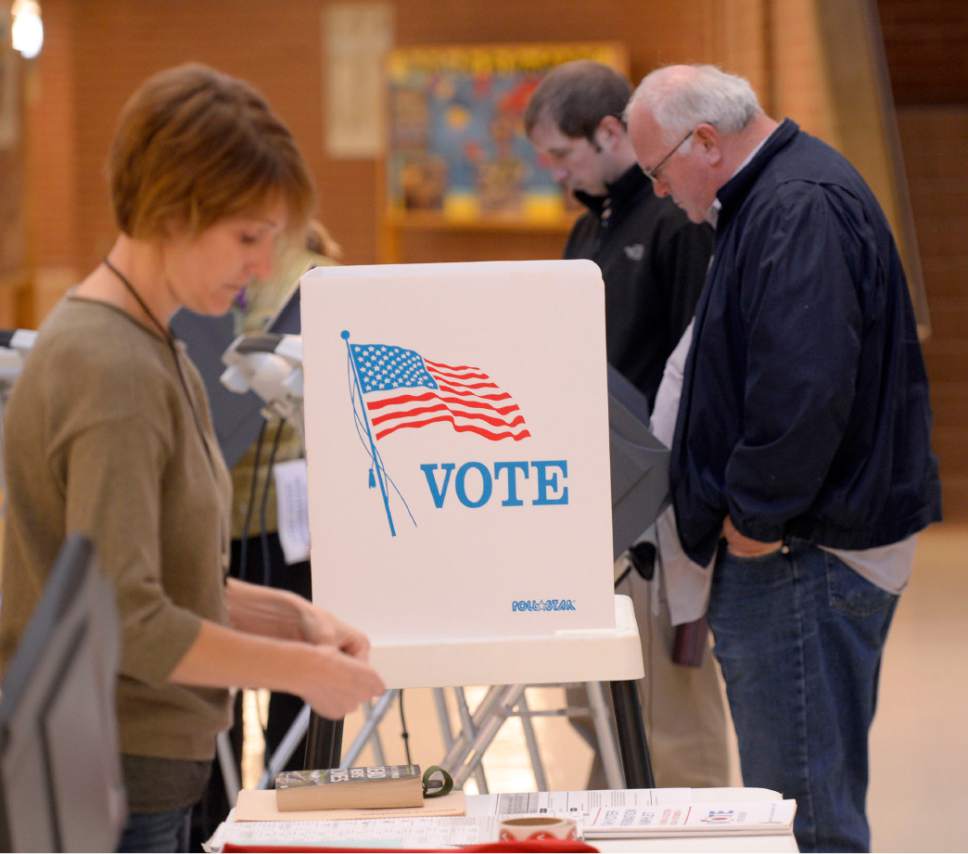This is an archived article that was published on sltrib.com in 2017, and information in the article may be outdated. It is provided only for personal research purposes and may not be reprinted.
A group of concerned voters is suing Utah Lt. Gov. Spencer Cox to prevent the release of certain information to a White House commission investigating election fraud.
The publication of the voter information would "undermine, and run afoul of, the State's carefully crafted regulation of the use of voter data," according to the lawsuit, filed Thursday in 3rd District Court by the League of United Latin American Citizens of Utah (LULAC) and the League of Women Voters of Utah (LWV).
President Donald Trump's Presidential Advisory Commission on Election Integrity requested voter information from all states in June — including names, addresses, demographic information, partial Social Security numbers, party affiliations, felony convictions, registration and which elections voters have participated in since 2006.
After receiving the request, Cox announced June 30 that he would provide only publicly available data and protect sensitive information.
State law imposes strict limitations on access to private records, and even stricter ones on how those records can be used, the suit states.
"I assure the voters of Utah that we will only provide information that is otherwise available to the public," Cox said in June, listing Social Security and driver license numbers as protected information that would not be shared.
Mark Thomas, Cox's chief deputy and state director of elections, disputed some of the claims in the lawsuit, affirming that the lieutenant governor would not be sharing voter-registration records previously designated as private and that the commission would likely be required to pay a fee to access the database, unless it applied for and received a waiver from the lieutenant governor's office.
"They base a lot of [the lawsuit] off of the statement that the lieutenant governor provided [in June] and the statement was just that — a statement," Thomas said. "It didn't dictate every process or procedure and rule and law that we were going to follow in order to ensure we're compliant with state law as well as trying to being compliant with the federal government's request."
In June, Cox did not say whether he would share birth dates, which are treated as private records in Utah but are publicly available for some uses. But Thomas told The Salt Lake Tribune that the state will not release birth dates to the commission unless it determines the use of such information would comply with Utah law.
The groups suing also are concerned about the commission making voter rolls public.
The lawsuit argues that if the database were made public, the elections chief would be unable to guarantee that the information would be used legally because someone could request the information directly from the commission rather than from the state. Therefore, private firms could use the information however they saw fit, the lawsuit states.
But Thomas said private organizations are already able to gain access to the information, so voters' information would be no more available than it's always been.
"People come in and purchase this all the time," he said. "We don't have a choice. The law says this is public information."
Both LWV and LULAC Utah organize voter-registration events, and the lawsuit's authors expressed concern that the release of voter rolls would discourage political engagement.
"[Current] and prospective voters will be more reluctant to participate in elections or register to vote in the future if they understand that [the election chief] is willing to provide information on the Voter List to entities who openly admit that they intend to make the information public," the lawsuit states.
Thomas said nine people across the state have had their information removed from the database over the last month but said he has no way of knowing whether that was because of the commission and privacy concerns or because of people moving.
"I don't think it's an issue where people are running to the clerk's office," he said.
The groups also say the information in the Utah Voter Database could be used to "solicit, harass or otherwise infringe upon the privacy" of voters, including members of the LWV and LULAC Utah.
Two of the members of LULAC Utah, Cheronne Anderson and Lavinia Taumoepeau-Latu, are plaintiffs in the lawsuit and expressed concern that their information could be used against them because of their unique names.
"Public disclosure of such personal information could expose [both women] to intimidation or harassment for merely exercising her right to vote, and may chill [their]exercise of First Amendment rights, including the right to vote and freedom of association," the lawsuit states.
That won't be an issue, according to the commission. In a letter obtained by The Salt Lake Tribune, the vice president of the commission assured Cox on Wednesday that it would be keeping voter information private.
"Individuals' voter registration records will be kept confidential and secure throughout the duration of the Commission's existence," wrote Kris Kobach, the Kansas secretary of state. "Once the Commission's analysis is complete, the Commission will dispose of the data as permitted by federal law."
Kobach has a history of imposing strict voter registration standards in his state and was once successfully sued by the ACLU for preventing thousands of eligible voters from registering.



